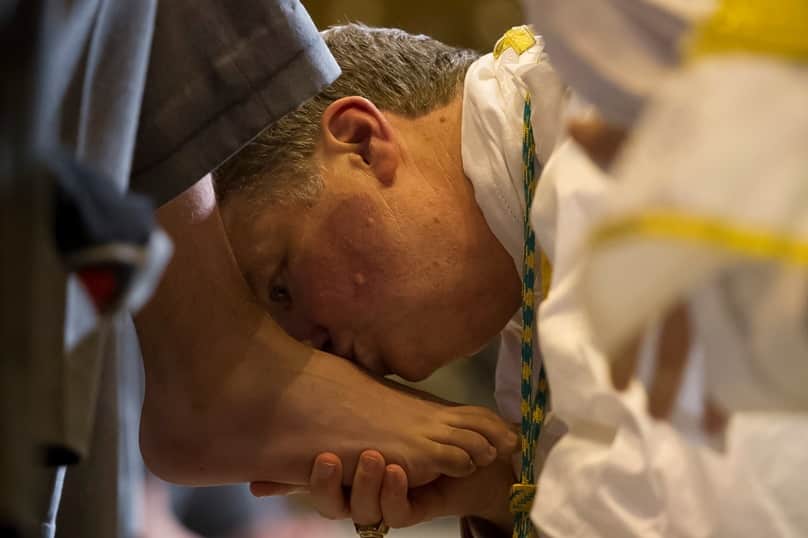
‘Cheers,’ people say as they raise their glasses, ‘Your health’.
We are rarely conscious that such a toast is a prayer – for health, healing, safety, happiness – for ourselves and each other. The Risen Christ returns to us on Easter day and, raising a glass full of the new wine of the kingdom, He says: Shalom.
Not just “Hi”. Not just “I’m back!”. No: “Shalom, peace, salvation, your health.” Then He shows us His wounds.
Peace and wounds – they seem to go together. Peace negotiations only come amidst tensions, perhaps after terrible violence. The Mass represents the greatest wound ever inflicted, inflicted upon God Himself, and the greatest ever peace-talk. So the bishop or priest begins Mass with the Easter greeting, ‘Shalom, peace be with you,’ and immediately, just like the Risen Lord, shows us his hands.
We say it many times during Mass: peace, the Lord be with you, God’s Spirit be with your spirit. We pray for that peace that heals not just the Victim but the perpetrators.
In recent months I have been blessed to experience a growing sense of this healing Easter peace, amidst the brokenness of my illness. Although it can be difficult to remain at peace while we are suffering, it is often in radical woundedness that we most appreciate the healing peace of Christ. “The peace that only Christ can give” is more than resigning ourselves to suffering. It enables us somehow to consent actively to our burdens and to unite our suffering to the suffering of the crucified Christ.
We all need this Easter peace. No one is exempt. Our resistance to God lacerates our own souls as much as Jesus’ body. We see the effects of sin in the dysfunction in ourselves and our society, in the brokenness of relationships and of a world that is clearly not as it should be.
Suddenly, out of the darkness of the grave, steps the Word of light. “Shalom”, He says, not just “stop quarrelling” but “here, have my sort of peace, a deep, abiding harmony, that heals division, roots out violence, brings fullness of life.”
Easter-time-peace is the kind of peace that calls for healing amidst all the woundedness, for a grace-that-heals even after death. The One who has risen from the tomb shows that every break with God, each other, ourselves, however grave, can yet be healed; that nothing can separate us from the love of God; that whatever we’ve done He will take us back. His open arms are not just displays of hurt and healing but arms wide open with welcome for the returning soul.
Of course this healing peace has come at a cost. The protestant pastor martyred by the Nazis, Dietrich Bonheoffer, spoke of ‘cheap grace’, the illusion that such welcome healing and healing welcome can come easy. But there is no Easter without Good Friday, no resurrection without the cross, no healing but for the wounded. Unlike the easy words of a toast, Easter shalom costs. It costs Christ His very life.
Yet even after He has paid the ultimate price for our salvation, Christ does not lord this debt over us. Rather, He shows us His wounds and offers us His peace. He does not force us to accept Him, but He offers forgiveness and mercy and asks that we extend that same forgiveness and mercy to others.
Sometimes we are sceptical about God’s offer of mercy. We think we are unworthy; that we are too far gone or are beyond help or we think we are too worthy; that we don’t need anyone’s help least of all God’s. But it is precisely when we are at our lowest, when we feel most helplessness, that we can most appreciate the crucified Christ who, himself hanging helpless on the Cross, continued to thirst for our salvation. Certainly that has been my own experience during the Lent that stretched for me from Christmas to Easter.
In this Year of Mercy, the Church is being re-called to Her important mission: to forgive sins, to preach the Gospel, and to heal a fallen and anxious world. As Easter comes and goes we can think it is all about a private experience of inner peace. It is that, certainly, but not only that. The Great Co-Mission is to join Christ in extending His arms, His wounded and glorified hands, to all. That’s the task of every Christian not just the clergy. What we receive through Easter we must pass on to others.
No end of celebrations of ashen and cruciform repentance, of watery and oily rebirth, no end of pastoral planning and years of mercy, will bring real and lasting Shalom unless we accept that great commission.
“Cheers, Happy Easter, your health”, Jesus says, “now get going.”
The blessings of this holiest of seasons for you and all your loved ones.
